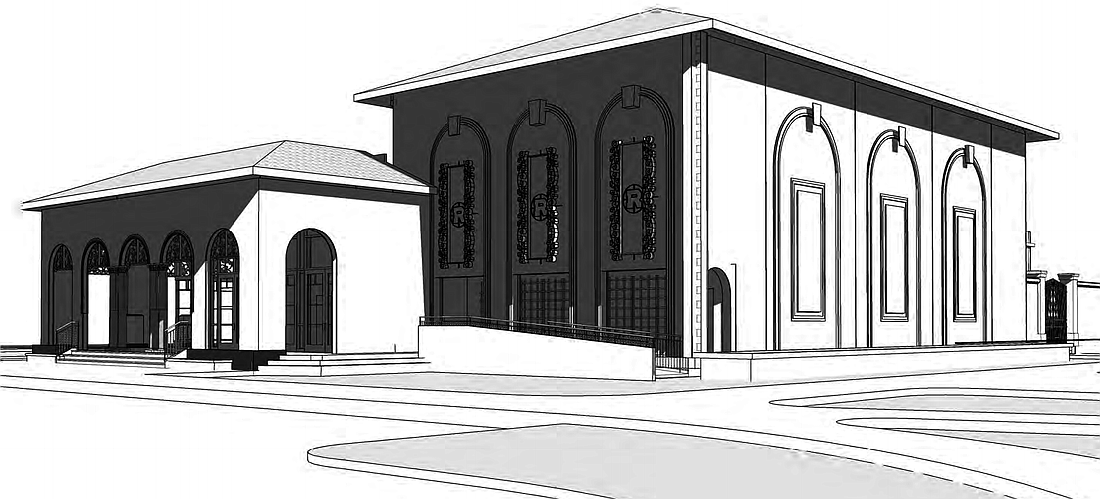- October 23, 2024
-
-
Loading

Loading

It’s showtime for a new black box theater at Rollins College.
Winter Park City Commissioners gave final approval at their meeting Monday, Jan. 14, for a project that would put a new theater building on the site of the former Fred Stone Theater.
The new 11,665-square-foot black box theater facility will seat 130 people and feature retractable seating for maximum flexibility with the space, along with faculty offices, dressing rooms, classrooms and general storage areas.
The old theater — which sat at the southwest corner of Fairbanks and Chase avenues before it was torn down last year — was built in 1926 and formerly served as Winter Park Baptist Church.
“I’ve been at Rollins for four years now, and from the time stepped foot on campus, I’ve been receiving missives from theater students and their parents and alumni about the Fred Stone Theater and its decrepit state,” Rollins College President Grant Cornwell said. “This project is going to be for us to replace the black box theater, which is the experimental theater where our students produce and direct and perform their works, and also a new dance studio.
“Rollins’ undergraduate theater program is ranked in the top 25 in the nation and actually the top undergraduate theater program in Florida,” he said. “We’re proud of that, and we’re going to take this opportunity to build a facility that really lifts up theater.”
The footprint of the new building is larger than the previous theater and involves closing the existing Chase Avenue to vehicular traffic and redeveloping it as a pedestrian path leading from Fairbanks Avenue into the campus.
That might be for the best, Planning Manager Jeff Briggs said, because getting on and off of the road from Fairbanks Avenue can be unsafe.
“Getting into Chase or making a left out is a scary maneuver at many times of the day, so in the interest of traffic safety, they’re turning Chase into a pedestrian corridor so access will be around through the regular Holt entrance,” Briggs said. “That should be a very big plus in terms of traffic safety.”
QUIET ZONES COMING SOON
City Manager Randy Knight told the City Commission that Winter Park should have quiet zones in place by the end of the summer — putting an end to train operators laying on the horn as they go through railroad crossings.
Mayor Steve Leary added that pre-work already has been taking place at the various crossings in the city.
“We are ahead of the game,” Leary said. “A lot of the work has already been done, so it should be a pretty quick integration.”
Winter Park entered an agreement with the Florida Department of Transportation to establish quiet zones at all 16 of its railroad crossings. According to the FDOT Rail Handbook, a “quiet zone” is defined as “a section of a rail line at least a half-mile in length that contains one or more public crossings at which locomotive horns are not routinely sounded.”
The plan calls for upgraded safety measures to be put into place, so train engineers no longer will have to blow their horns unless there is a dangerous situation.
The quiet zones come after numerous residents have complained about the train horns blaring at late hours of the night near residential areas.
CANOPY PROJECT STILL IN DESIGN PHASE
Knight said city staff still is working with the design team to bring the library/event center project within its $30 million budget. Once that happens, the design will be brought before the commission with some alternate opportunities they can choose to fund or for which they can seek fundraising.
The fundraising team has been asked by Knight to provide an estimate of how much they can reasonably raise and already have raised by April 1. That effort to acquire funds would help pay for add/alternates such as a rooftop venue on the event center, a raked auditorium in the library and a lakeside amphitheater.
Leary made it clear the project has been on budget, aside from legal fees the city was forced to pay in 2016 in a legal battle over the location of the project.
“Regardless of some reports from a few individuals, the only increased expense to taxpayers on this project so far has been the lawsuit brought against the taxpayers and the voters of the city by a small group,” Leary said. “Any additional monies that had to be spent to move this forward as of today have been not due to overages, because we’re still working through the budget.”